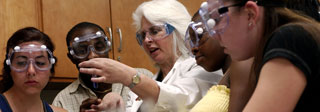School of Theoretical and Applied Science (TAS)
School of Theoretical and Applied Science Website
Dean - Bernard Langer
| Programs: Pre-Med and Pre-Health Programs |
| Related Links: Career Paths |
About the School
The School of Theoretical and Applied Science (TAS) offers an integrative approach to the sciences and mathematics. While retaining the rigor and depth of each program without the boundaries of traditional science departments, students and faculty interact freely and creatively across the disciplines. Computer scientists have worked with the molecular biologists to develop the new curriculum in Bioinformatics. Physicists have established courses in climatology for the Environmental Science program. And the mathematicians and chemists have worked together to provide foundational courses in all of the majors. Such integrative collaboration is the norm in the School, not the exception.
The School of TAS offers twelve majors and curricular tracks independently and collaboratively: Allied Health Technologies (jointly with the University of Medicine and Dentistry of New Jersey – UMDNJ), Biochemistry, Bioinformatics, Biology, Chemistry, Clinical Laboratory Science (jointly with UMDNJ), Computer Science, Environmental Science, Integrative Science Studies, Mathematics, Nursing, and Physics. Minors are available in Biology, Chemistry, Computer Science, Environmental Science, Mathematics, Physics, and Science, Technology, and Society. The School sponsors two graduate programs, a Master of Science in Educational Technology (MSET), and a Master of Science in Nursing – Nursing Education (MSN-Nursing Education). The School of TAS also maintain several articulation agreements with area graduate and professional schools. Further descriptions of those agreements appear in the Majors section of this Catalog.
TAS’s resources include a diverse array of modern, well-equipped
teaching laboratories. Entry-level laboratories in biology,
chemistry and physics are computerized, allowing students to gain laboratory based computer skills at the very beginning of their college careers. The School also has several dedicated computer laboratories designed for special study – in Bioinformatics, Geographical Information Systems (GIS), Nursing, and for study research and projects. A new greenhouse for teaching and research and an innovative classroom associated with it on site are being constructed with occupancy scheduled for Fall 2007.
TAS faculty members excel at teaching and are also internationally
recognized for their scholarship and participation in scientific
organizations. Many have received awards, fellowships, and grants
from private, international, and government agencies including
the American Chemical Society, Fulbright Foundation, Guggenheim
Foundation, National Institute of Health NIH), National Oceanographic
and Atmospheric Administration (NOAA), National Science Foundation
NSF), New Jersey Commission on Higher Education, New Jersey
Department of Environmental Protection, and the U.S. Department of Education. Faculty engage students in distinctive collaborative research, and have fostered and encouraged the presentations of students' work at regional and national professional meetings and in publications. In addition to special projects, the School of TAS maintains an elective research curriculum for all students, the "TAS-Research Honors Program," which provides a course record for continuing research and which grants certificates upon successful completion.
The School of TAS also requires that all students meet a core curriculum in mathematics and in Science in Cultural Perspective (SCP), consisting of courses which foster an appreciation and understanding of the historical, philosophical, ethical, and social contexts of scientific and technological development.
Ramapo’s cooperative education program provides opportunities
for working in a "real life environment". Under the
joint supervision of a scientist at the work-place and a TAS
faculty member, co-op students earn degree credits while earning
money. A strong internship program (where students earn degree
credits for work done on a volunteer basis) is also available.
Student organizations such as the Biology, Chemistry, Math,
Pre-Med, Physics Clubs and the Environmental Alliance sponsor
lectures, trips, and social activities. Each club elects officers
who gain leadership experience in planning programs such as
the annual Earth Day celebration. Ramapo’s chapter of the
Society of the Sigma Xi, a national organization for faculty,
fosters research and schedules lectures by national and international
authorities.
| Ramapo College of New Jersey recognizes the value of publishing on the Internet and encourages the campus community to produce personal World Wide Web pages to enhance communications. The College does not preview, review, censor, or control the content of these pages in any way as a matter of course. Personal Web pages are those of the authors, and do not in any way constitute official Ramapo College of New Jersey content. |
[ return to top ]



